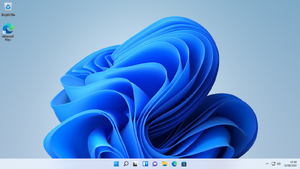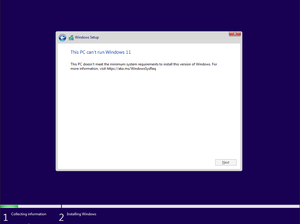How to install Windows 11 in QEMU
< Windows 10 | <<< Table of Contents

Windows 11 is an operating system created by Microsoft which was officially released on October 5, 2021. The first build of Windows 11 (Build 21996) was leaked sometime in June 2021. It is the latest version of Windows.
Running on CollabVM
Windows 11 works alright, but can be somewhat slow on QEMU even with KVM turned on. Disabling and uninstalling unnecessary background applications helps fix this problem. VM6 currently runs the 22000.556 build of Windows 11.
Windows 11 is exceedingly slow without virtualization, so if you don't have root/KVM/Xen, speeds are not optimal.
Recommended version if you meet the requirements: Latest version (Pro)
Recommended version for if you don't meet the requirements: Version 22000.184 (Pro)
Before you begin

If installing any build newer than 22000.194 or 22458, make sure your VM has TPM 2.0, Secure Boot, UEFI, and at least 4 GB of RAM. Older beta builds of Windows 11 do not have these checks and these are not required.
If your VM does not have TPM 2.0, Secure Boot, or 4 or more GB of RAM, you will need to use a few registry keys to bypass these checks during the setup. When you boot into the setup, proceed until you are the license agreement. Press Shift + F10 to open Command Prompt, then type regedit. From there, go to Computer\HKEY_LOCAL_MACHINE\SYSTEM\Setup, create a new key called LabConfig, and then create the following DWORD values:
- If your VM does not have TPM 2.0, make a DWORD value called BypassTPMCheck and set the value to 1.
- If your VM does not have Secure Boot, make a DWORD value called BypassSecureBootCheck and set the value to 1.
- If your VM does not have 4 GB of RAM, make a DWORD value called BypassRAMCheck and set the value to 1.
- If your VM does not meet the CPU requirements, make a DWORD value called BypassCPUCheck and set the value to 1.
Close regedit and type exit and hit enter to exit the Command Prompt. You should now be able to proceed with the installation.
Other methods
You can use a Windows 10 image and copy the install.esd (or wim, depends) to the sources folder of the Windows 10 image. Assuming your VM already meets the Windows 10 requirements (which it should, Windows 10 can run on most computers), you can proceed with the installation as normal. Windows 11 will boot and work fine.
You can also manually deploy the image using Command Prompt. You can follow this handy guide on how to manually install Windows 11 without the graphical setup.
Additionally, you can use WinNTSetup to deploy the WIM if you want an easy graphical interface. It runs in most PEs and is very easily accessible online. It is included in Hiren's Boot CD.
QEMU
Pre-installation
Make a qcow2 image (or a raw image if you want) by typing
qemu-img create -f qcow2 win11.img 60G
Windows 11 requires some disk space, specifically 60 GB minimum. 60 GB is fine and there will be lots of disk space to install programs onto
When that's done, run the following command:
qemu-system-x86_64 -hda win11.img -cdrom win11_iso_name.iso -boot d -accel kvm -cpu host -m 8G -usbdevice tablet
Or if running without root or virtualization:
qemu-system-x86_64 -hda win11.img -cdrom win11_iso_name.iso -boot d -cpu epyc -m 8G -usbdevice tablet
8 gigabytes of memory is highly recommended for optimal performance, but you can use 4 GB if absolutely necessary.
You'll also want to uninstall unnecessary applications and disable Windows Defender, so the VM won't be really slow.
During installation
It is recommended to install the Pro version, however you can install the Home version if you want. Note that you will need to sign in with a Microsoft account when you get to OOBE.
After installation
qemu-system-x86_64 -hda win11.img -cdrom win11_iso_name.iso -boot c -accel kvm -cpu host -m 8G -usbdevice tablet
Or if running without root or virtualization:
qemu-system-x86_64 -hda win11.img -cdrom win11_iso_name.iso -boot c -cpu epyc -m 8G -usbdevice tablet
Setting up your VM
After going through the OOBE, it is recommended to go through gpedit.msc and manage some policies. If you have an AD (Active Directory) server, you can hook up your VM to that and manage policies there. If you want, you can also "debloat" the OS making it run slightly faster.